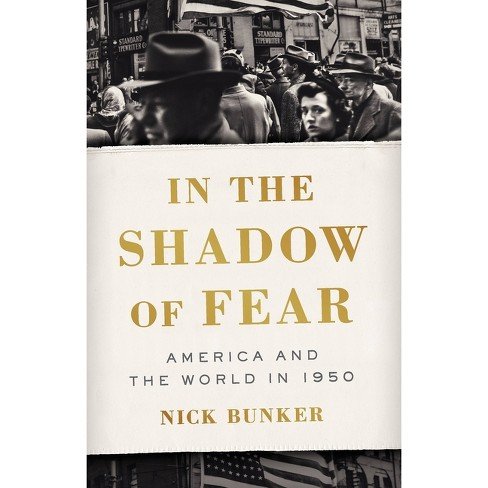In the Shadow of Fear by Nick Bunker
/In the Shadow of Fear: America and the World in 1950
By Nick Bunker
Basic Books 2023
Historian Nick Bunker’s previous two best books, Making Haste from Babylon and Young Benjamin Franklin, were brimming with tenacious faith and the sunlight of promised better days, a sharp contrast with his latest, In the Shadow of Fear: America and the World in 1950. A glance at the US cover from Basic Books gives a quick diagnostic: a black-and-white crowd photo full of dark shadows, dingy shop signs, and, snagging the eye, the drawn, worried face of a woman spotting the camera.
Bunker’s focus is the single year 1950, which he’s researched down to every detail and local newspaper column (readers with lots of time on their hands might perhaps reconstitute some of that research from his chapter notes; inexcusably, the book has no bibliography). The year is full of signpost events: on the domestic front, bare-knuckled political infighting, and on the international front, the ascendency of Mao in China and the development of the atomic bomb in the Soviet Union. Bunker knows that these international events fuel the domestic tensions that are his main concentration, and he presents them in italicized four-page prefaces to each chapter. This makes In the Shadow of Fear an oddly discordant reading experience, but maybe that was the point.
The book is a marvelous procession of personalities; this has always been a strength of Bunker’s, and readers will be glad he indulges himself in these pages. Of course signature to the time is US President Truman (here, as in life, mostly a quippy cipher), but the bulk of the action is dominated by two men. One is Senator Robert Taft (“In the opinion of many, Taft was the finest debater and maker of new laws that America possessed,” Bunker writes. “He studied hard, he fought hard, and he did not surrender”), wielding the headline-friendly bluntness of inveterate corruption against power politics of the day.
And most of all, the central character of the book, America’s imperious Secretary of State Dean Acheson, described by Bunker, in perhaps unconsciously ominous tones, as “the right person at the right time.” Acheson is omnipresent here, either constructing or deconstructing every pivotal international twist and turn, and Bunker genuinely seems to enjoy his pompous, bristlingly honest company, even sometimes to admire him. “If all that mattered in government were hard work, integrity, and intellect, America could have asked for no finer public servant than Dean Acheson,” he writes in a typical passage. “At fifty-six, the secretary of state made a figure so imposing — six feet one, with a determined stride, and suits as finely cut as Cary Grant’s — that often his physical presence eclipsed the inner qualities that made him what he was.”
The caustic two-man Greek chorus to all these events throughout the book comes from the New York Herald-Tribune columns by Joe and Stewart Alsop, but Bunker naturally assumes something of that role himself, noting the darker shading of the year’s events. These moments are the book’s best, always showing the twists of Bunker’s insights to unpredictable advantage. He mentions the day in April when John Foster Dulles became Acheson’s ambassador-at-large for the State Department, then zeroes in on Kansas City, where two of the city’s most corrupt operators had recently been called on to testify about the city’s rackets to a federal grand jury:
The previous evening, witnesses had seen Charles Binaggio, a Democratic ward boss and numbers racketeer, and Charlie Gargotta, his enforcer, drinking at the Last Chance Tavern, Kansas City’s most notorious gambling den. On the morning of the sixth, the police found their corpses in Binaggio’s headquarters, the Democratic Club on Truman Road: each man had four bullets in his head. Gazing across the room, above the bodies and the pools of blood, there hung a giant photograph of Harry Truman.
In the Shadow of Fear presents the story of a year, and for all their popularity, such micro-histories have plenty of inherent limitations. World events don’t neatly confine themselves to calendars, and the bitter anxieties besetting the postwar United States only worsened as the early ‘50s progressed. But Bunker sets the tone for all those future little apocalypses.
Steve Donoghue is a founding editor of Open Letters Monthly. His book criticism has appeared in The Washington Post, The American Conservative, The Spectator, The Wall Street Journal, The National, and the Daily Star. He writes regularly for The Boston Globe, the Vineyard Gazette, and the Christian Science Monitor and is the Books editor of Georgia’s Big Canoe News.
